|
|
|
Sort Order |
|
|
|
Items / Page
|
|
|
|
|
|
|
| Srl | Item |
| 1 |
ID:
119482


|
|
|
|
|
| Publication |
2013.
|
| Summary/Abstract |
The link between cyberspace and national security is often presented as an unquestionable and uncontested "truth." However, there is nothing natural or given about this link: It had to be forged, argued, and accepted in the (security) political process. This article explores the constitutive effects of different threat representations in the broader cyber-security discourse. In contrast to previous work on the topic, the focus is not solely on discursive practices by "visible" elite actors, but also on how a variety of less visible actors inside and outside of government shape a reservoir of acceptable threat representations that influence everyday practices of cyber-security. Such an approach allows for a more nuanced understanding of the diverse ways in which cyber-security is presented as a national security issue and of the consequences of particular representations.
|
|
|
|
|
|
|
|
|
|
|
|
|
|
|
|
| 2 |
ID:
119477
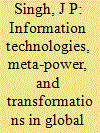

|
|
|
|
|
| Publication |
2013.
|
| Summary/Abstract |
The transformational impact of information technologies changes the dominant meanings of the identity and interests of global actors. These transformations cannot be ascertained through technology's impact upon the capabilities of actors as understood in traditional accounts of power. The concept of meta-power explains the new meanings, which come about in global politics from an increasing number of perspectives and interactions facilitated through information exchanges and learning. Especially when information technologies diffuse or decentralize relations across global actors, we would expect that increased interactions among them would allow new meaning formation to increase. Individual and social identities are no longer singular or linearly consistent through time, and global politics reveal multiple meanings for the issues and actors in question. Illustrative examples are provided for individual-level identity formation and for the implications for global politics in networked environments.
|
|
|
|
|
|
|
|
|
|
|
|
|
|
|
|
| 3 |
ID:
119476
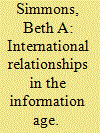

|
|
|
| 4 |
ID:
119481
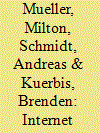

|
|
|
|
|
| Publication |
2013.
|
| Summary/Abstract |
This paper asks whether the Internet's heavy reliance on nonhierarchical, networked forms of governance is compatible with growing concerns about cyber-security from traditional state actors. Networked governance is defined as a semipermanent, voluntary negotiation system that allows interdependent actors to opt for collaboration or unilateral action in the absence of an overarching authority. Two case studies-Internet routing security and the response to a large-scale botnet known as Conficker-show the prevalence of networked governance on the Internet and provide insight into its strengths and limitations. The paper concludes that both cases raise doubts about the claim that introducing security concerns into Internet governance necessarily leads to more hierarchy and/or a greater role for governments.
|
|
|
|
|
|
|
|
|
|
|
|
|
|
|
|
| 5 |
ID:
119483


|
|
|
|
|
| Publication |
2013.
|
| Summary/Abstract |
The United States has a long history of deploying new technology as a mechanism for public diplomacy (the conduct of foreign policy by engagement with foreign publics) but it was relatively slow to make full use of the on-line technologies known as Web 2.0. This essay reviews the early work of the US Information Agency (1953-1999) in the field of computer and on-line communications, noting the compatibility of a networking approach to USIA's institutional culture. The essay then traces the story forward into the work of the units within the US Department of State which took over public diplomacy functions in 1999. The article argues that this transition deserves a large part of the blame for the difficulty which the risk-averse State Department displayed in embracing first the web and then the full range of qualities associated with Web 2.0. The State Department has emphasized one-way broadcast media rather than two-way relational media and functions connected with listening and exchange diplomacy were subordinated to advocacy. The essay also notes the challenge of a non-diplomatic agency-the Department of Defense-playing a dominant role in digital and other forms of outreach at some points in the process. The essay ends by noting the recent evolution of the State Department's approach to digital media and the emergence of a non-governmental model for American digital outreach (known by the acronym SAGE) which may overcome many of the institutional limits experienced thus far and provide a way to bring together the relational priorities of the New Public Diplomacy with the relational capacities of Web 2.0 technology.
|
|
|
|
|
|
|
|
|
|
|
|
|
|
|
|
| 6 |
ID:
119480
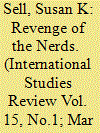

|
|
|
|
|
| Publication |
2013.
|
| Summary/Abstract |
For the first time in thirty years of ever stronger intellectual property policies, a transnational coalition of Internet users was able to kill two US anti-piracy bills that were backed by some of the most politically connected and economically powerful interests in US politics. Combining insights from the literatures on social movements, networks, and Internet activism, I analyze the structure for social mobilization, the form of the coalition, the role of framing, and the use of technology contributing to its success. The literature on social movements and contentious politics addresses situations of threats or grievances that lead actors to mobilize for collective action. In this case, Goliath's latest gambit to ratchet up intellectual property standards threatened David's use of the Internet. This time David beat Goliath.
|
|
|
|
|
|
|
|
|
|
|
|
|
|
|
|
| 7 |
ID:
119478


|
|
|
|
|
| Publication |
2013.
|
| Summary/Abstract |
Many agree that digital technologies are transforming politics. They disagree, however, about the significance and character of that transformation. Many of the pioneers of understanding the distinctive dynamics of new digital media platforms-social media and collaborative production-are quite optimistic about the potential for the Internet to dramatically increase the quality of democratic governance. On the other hand, some political scientists who have examined actual patterns of political activity and expression on digital platforms come away skeptical that digital platforms will bring equality or inclusion to democratic politics. We bring these two opposed perspectives in this article by developing six models of how digital technologies might affect democratic politics: the empowered public sphere, displacement of traditional organizations by new digitally self-organized groups, digitally direct democracy, truth-based advocacy, constituent mobilization, and crowd-sourced social monitoring. Reasoning from the character of political incentives and institutional constraints, we argue that the first three revolutionary and transformative models are less likely to occur than the second three models that describe incremental contributions of technology to politics.
|
|
|
|
|
|
|
|
|
|
|
|
|
|
|
|
| 8 |
ID:
119479
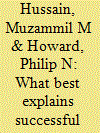

|
|
|
|
|
| Publication |
2013.
|
| Summary/Abstract |
It has been 15 years since the last wave of democratization. But as a region, North Africa and the Middle East were noticeably devoid of popular democracy movements-until the early months of 2011. Democratization movements had existed long before technologies like mobile phones and the Internet came to these countries. But with these technologies, people sharing an interest in democracy built extensive networks and activated collective action movements for political change. What might have made regimes more susceptible than others to these uprisings, and what might explain the relative successes of some movements over others? What role does information technology have in the modern recipe for democratization? Weighing multiple political, economic, demographic, and cultural conditions, we find that information infrastructure-especially mobile phone use-consistently appears as one of the key ingredients in parsimonious models for the conjoined combinations of causes behind regime fragility and social movement success. To understand the successes and failures of contemporary political protests, we must also assess how civil society leaders and authoritarian security forces treat communication technologies as democratically consequential.
|
|
|
|
|
|
|
|
|
|
|
|
|
|
|
|
|
|
|
|
|